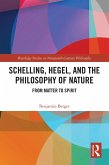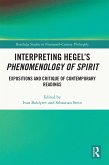Dieser Download kann aus rechtlichen Gründen nur mit Rechnungsadresse in A, B, BG, CY, CZ, D, DK, EW, E, FIN, F, GR, HR, H, IRL, I, LT, L, LR, M, NL, PL, P, R, S, SLO, SK ausgeliefert werden.
Jason M. Wirth, Seattle University, USA
"Not only does this book do important work in clearly explicating key aspects of Schelling's philosophy of nature, it also invites us to remember how similar Hegel and Schelling really are - and it is therefore able to highlight fundamental aspects of their shared project that is so often occluded by the tendency to pit them against one another. A compelling work that is likely to become a central text in the field of German idealism."
Charlotte Alderwick, University of the West of England, UK









